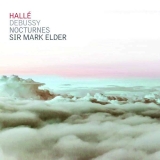 Claude Debussy: Nocturnes + La Damoiselle Elue + Première Rapsodie für Klarinette & Orchester + Marche écossaise sur un Thème populaire + Les Soirs illuminés par l'ardeur du charbon (Tr. C. Matthews); Sophie Bevan, Sopran, Anna Stephany, Mezzosopran, Hallé Choir, Hallé Youth Choir, Hallé Orchestra, Mark Elder; 1 CD Hallé HLL 7952; Aufnahme 04/2019, Veröffentlichung 11/2019 (64'56) - Rezension von Remy Franck
Claude Debussy: Nocturnes + La Damoiselle Elue + Première Rapsodie für Klarinette & Orchester + Marche écossaise sur un Thème populaire + Les Soirs illuminés par l'ardeur du charbon (Tr. C. Matthews); Sophie Bevan, Sopran, Anna Stephany, Mezzosopran, Hallé Choir, Hallé Youth Choir, Hallé Orchestra, Mark Elder; 1 CD Hallé HLL 7952; Aufnahme 04/2019, Veröffentlichung 11/2019 (64'56) - Rezension von Remy Franck
Das Hallé hat unter seinem Chefdirigenten Mark Elder eine sehr schöne Debussy-CD herausgegeben. Sie beginnt mit den Nocturnes. Nuages ist wolkenleicht, soft und schwebend. Selbst die deutlicher als sonst vernehmbaren Pizzicati wirken schwerelos. So schön atmosphärisch hat man dieses Stück nicht oft gehört. Auch in Fêtes bestimmt ein leichter federnder Klang das spannende musikalische Geschehen. Sirènes wird frisch und vital aufgeführt, vielleicht weniger mysteriös als in anderen Interpretationen, aber sehr farbig.
Sergio Castello ist der weich und stimmungsvoll spielende Solist in der Ersten Rhapsodie für Klarinette und Orchester. Colin Matthews hat das kleine Stück ‘Les soirs illuminés par l’ardeur du charbon’ orchestriert und das Wärme spendende Feuer im Ofen sehr schön dargestellt. Das kleine Werk ist Debussys klingende Hommage an den Kohlenhändler Monsieur Tronquin.
Die Kantate La Damoiselle Elue komponierte Debussys im Alter von 25 Jahren in Rom. Geschrieben für Sopran (Damoiselle), Mezzosopran (Erzählerin), vierstimmigen Frauenchor und Orchester ist sie wohl noch nicht ganz der typische Debussy. Sie basiert auf einer Dichtung des Engländers Dante Gabriel Rossetti in der französischen Übersetzung von Gabriel Sarrazin, die von einer verstorbenen Frauengestalt, der « blessed damozel » oder auch « damoiselle élue », handelt, die aus dem Himmel auf die Erde herabschaut und sich nach ihrem Geliebten sehnt. Anna Stéphany, Sophie Bevan und das Hallé sorgen für eine inspirierte Interpretation und beschließen damit eine von Anfang bis Ende spannende Debussy-Produktion.
The Hallé has released a lovely Debussy CD under its chief conductor Mark Elder. It begins with the Nocturnes. Nuages is light as clouds, soft and floating. Even the pizzicati seem more weightless than usual. A beautifully atmospheric performance! In Fêtes a flexible and supple sound is exciting. Sirènes is heard in one fresh and vital performance, perhaps less mysterious than in other interpretations, but very colourful.
In the First Rhapsody for clarinet and orchestra Sergio Castello’s playing is soft and atmospheric. Colin Matthews orchestrated the small piece ‘Les soirs illuminés par l’ardeur du charbon’ and beautifully depicted the warming fire in the oven. The small work is Debussy’s musical homage to the coal merchant Monsieur Tronquin.
The cantata La Damoiselle Elue was composed by Debussy at the age of 25 in Rome. Written for soprano (Damoiselle), mezzo-soprano (narrator), female choir and orchestra, it is not quite the typical Debussy yet. It is based on a poem by the English writer Dante Gabriel Rossetti in the French translation by Gabriel Sarrazin, which deals with a deceased female figure, the « blessed damozel » or also « damoiselle élue », who looks down on earth from heaven and yearns for her lover. Anna Stéphany, Sophie Bevan and the Hallé provide an inspired interpretation which concludes an exciting Debussy production.
























